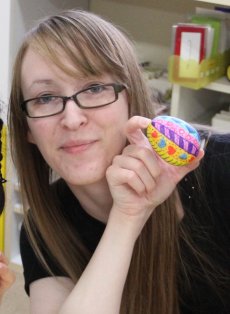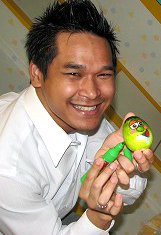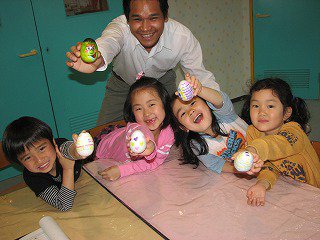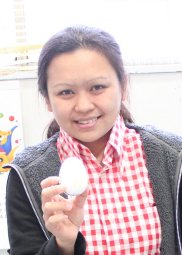2013年05月号(Vol.200)イースターの思い出
4月22日(月)~27日(土)、幼児クラス、小学生の低学年クラスではイースタークラスを楽しみました。例年は木製のたまごでしたが、今年はたまごらしさを出すために発泡スチロールの白いたまごにカラーリングをしました。イースターは日本であまり馴染みがありませんね。海外ではどのようにイースターを過ごすのでしょうか?ニッセイトの講師に、幼少の頃のイースターの思い出を語ってもらいました。
 Jethro(ジェスロ)講師 アメリカ・ハワイ州出身
Jethro(ジェスロ)講師 アメリカ・ハワイ州出身
アロハ!私は、フィリピンのマニラで生まれ、2才の時にハワイに移住しました。
さて、私のイースターの思い出を少しお話します。私も子供の頃、イースターをいろいろな意味においてとても楽しみにしていました。その理由は、イースターの前の木曜日、金曜日は学校がお休みになることでした。カトリック教徒の家庭に生まれたのでレント(受難説)という習慣がありました。レントとは、イエス・キリストが40日もの長い期間、断食して荒野をさまようという修行にならい、イースター前の40日間を肉、卵、油、乳製品などを控えて、食事を節制し、お祝い事も避けるという習慣のことです。神への恩義を再確認するとても重要な機会です。子どもたちは、お菓子やジュースを絶ちます。日曜日のイースターには、かごいっぱいにチョコレートやいろいろなお菓子がもらえるので、レントが終わるのをとても楽しみにしていました。
イ-スターの前日は、お母さんやお母さんの友だちが家に来てイースターエッグ作りをしていました。私は従兄弟とたまごぶっつけ大会をよくやりました。それぞれがたまごを持ち、たまごをぶっつけ合います。割れ方の少ない方が勝ちです。私がたいてい勝ってましたよ(笑)。イースターの朝は、いつもより早く起き、最高の洋服に着替えて教会に行かなければなりません。大勢の人たちの中で、いつもより長いお話を聞かなければならないと思うと気が重かったです。私のイ-スターの思い出は特に目新しいものではないかもしれませんが、大人になった今、自分の生き方の大切な一部になっているということを強く感じます。当時は考えもしませんでしたが、イースターは家族に絆をもたらしてくれました。私は、この素敵な思い出を生涯大切にしていきたいと思います。
Most of us may have childhood memories of by-gone Easter weekends. Some of them might recall the time spent with family and friends at home or at church. Other people may remember particularly exciting moments from their Easter egg hunts or reminisce about some special gift they received from a beloved relative.
When I was young, I used to look forward to Easter for several reasons. On the one hand, I knew that I would not have to attend school on the Thursday and Friday before that holiday. I craved this time off, especially since I did not have many vacation days in between Christmas and Easter. Coming from a Catholic family, I also had to give up something every year for Lent (the 40 days preceding Easter), which in my case usually meant forgoing either candy or soft drinks. For adults, this action often has a special significance; it helps them refocus their attention on their obligations to God and to their fellow men and women. As a young child, I did not make these connections; I simply saw it as my duty to family and God and did not hesitate to end my agreement as soon as the clock struck midnight on Easter morning. I also became excited at that time of year because I knew I would receive a basket full of candy on Easter Sunday. I already knew what types of sweets would be in the carrier, as the assortment of jelly beans, peanut butter cups, candy bars, and other goodies did not change from year to year; nonetheless, I still maintained a youthful sense of anticipation.
On the day before Easter, my Mom and her friends would come over and help me and my cousins to color eggs. We used generic, water based dyes and none of our creations were especially imaginative; however, that was okay. While I enjoyed coloring them, I thought it was much more fun to use them in egg cracking contests in which I and my cousins would each pick-up an egg and slam them together. The winner was the one whose egg had the fewest cracks; I usually prevailed.
In many ways, Easter Sunday was always a letdown. I had to get up earlier than usual so that I could dress in my very best clothes before heading to church. I then had to sit through a mass that lasted longer than usual and a church luncheon event that was usually rather dull. As an adult, I can appreciate and enjoy these aspects of Easter, the 8 or 9 year old version of me could not. I did enjoy myself once I got home, as I could stuff myself full of jelly beans and other types of candy. At the same time, I lamented the fact that I had to go back to school on Monday.
While my childhood, Easter experiences would not be considered newsworthy, they were an important part of my life. I had a chance to feel all the joy, excitement, and (sometimes) boredom that are part and parcel of any good Easter experience. I also had the chance to bond with family in ways that I did not appreciate at the time. I will cherish these memories for the rest of my life, and in this respect, I do not differ from other Americans celebrating Easter.

Regine(レジン)講師 カナダ・ケベック州出身
小さい頃、イースターの日曜日は、必ず家族と教会に行きました。その後は、祖父母の家に親戚がみんな集まります。私の家は大家族で、母方だけでも25人くらいの人数になります。遠くに住んでいる人もいますが、それでもイースターにはみんなが集まっていました。ですから、イースターは久しぶりに親戚の人たちに会えるとても良い機会なのです。
私たちもみんなでイースターエッグ作りはしました。でも、カナダには4月の末頃までたくさんの雪が残っています。ですから、エッグハントは一度もやったことがありませんでした。そのかわり、メイプルシロップを沸騰させ、家の外できれいな雪にそのシロップをかけます。すると雪の冷たさで、メイプルシロップがお菓子のタフィーのように固まるんです。それをアイスキャンディの棒にからませ食べます。おいしいんですよ!(笑)カナダ東部では、雪に砂糖をかけて食べるのは一般的な春の光景でもあります。
イースターの前夜は、イースターバニー(うさぎ)が私と弟にお菓子やチョコレートがいっぱい入ったバスケットを届けてくれます。イースター前の40日間は、「レント」といってお菓子は食べられません。ですからこのイースターバスケットの喜びはひとしおです。私の街にはもうひとつの習慣がありました。それは、夜明け前に湧水を汲んでくるというものです。この水は、「Easter Water(イースターの水)」と呼ばれ、癒しのパワーを秘めていると言われています。ですから、私たちはみんな大きなグラスにいっぱい飲みました。しかし、残念なことにこの習慣は現在なくなりつつあります。なぜなら公害や都市化のため、きれにな湧水を見つけることが難しくなってきたからです。
When I was young, I always went to church with my family on Easter Sundays. After that, we gathered at my grandfather’s place with all my uncles, aunts and cousins to have Easter dinner. My family is very big. In total, there are about 25 people just on my mother’s side. Some of them lived far away but they would come to town for Easter, so it was a good chance to see everyone together.
We decorated Easter eggs each year. But in Canada, there is usually still a lot of snow outside all the way until the end of April, so I have never done an egg hunt. Instead, my family sometimes boiled maple syrup and then poured it on clean, white snow. The cold of the snow made the maple syrup harden to taffy-like consistency. We then used popsicle sticks to roll it up into a kind of lollipop and then eat it. It’s very yummy! Having “sugar on snow” is a very popular springtime activity in Eastern Canada.
The night before Easter, the Easter bunny would usually leave a basket full of jelly beans and chocolate eggs and rabbits for me and my brother. We couldn’t eat sweets for 40 days before Easter as a part of a religious custom called Lent, so we were very happy to finally be able to indulge. We had so much chocolate, we could eat it for weeks after Easter!
Another custom in my hometown was to wake up before dawn on Easter morning to collect spring water. This water is called Easter water and it is believed to have healing powers. So we all drank a big glass of it. Sadly, this old tradition has been lost lately, because it is difficult to find clean spring water in the nature due to rising pollution and growing cities.
 Bory(ボーリー)講師 アメリカ・カリフォルニア州出身
Bory(ボーリー)講師 アメリカ・カリフォルニア州出身
イースターの日、私の家族は、教会に行ったり家族や親戚が集まり食事を一緒にしたりしましたが、あまり宗教的なことはしませんでした。イースターの思い出はやはりイースターエッグです。毎年、たまごを色で染めるのがすごく楽しみでした。それに、イースターでおなじみのお菓子を入れるかごも自分たちで作りました。チョコレートやジェリービーンズ、それにマシュマロのひよこなどがたくさんもらえるのですよ。
学校でもイースターエッグ作りをしました。私は絵を描いたりす るのが好きだったので、いろいろな色を使って丹念に仕上げました。仕上がったイースターエッグは、先生が外庭に持っていき、いろんな場所に隠します。エッグハントです。とってもワクワクしながらたまご探しに参加していた自分を鮮明に覚えています。積み上げられた材木の中に隠されていたり、木の上に隠されていたり、灌木の茂みの中に隠されていたり。難しければ難しいほど僕たちはたまご探しに夢中になりました。イースターは本当に楽しい思い出です。
るのが好きだったので、いろいろな色を使って丹念に仕上げました。仕上がったイースターエッグは、先生が外庭に持っていき、いろんな場所に隠します。エッグハントです。とってもワクワクしながらたまご探しに参加していた自分を鮮明に覚えています。積み上げられた材木の中に隠されていたり、木の上に隠されていたり、灌木の茂みの中に隠されていたり。難しければ難しいほど僕たちはたまご探しに夢中になりました。イースターは本当に楽しい思い出です。
My fondest memories of Easter were happy memories. Every year during April in school I would look forward to dying eggs and making Easter basket and getting all the goodies (chocolate) jelly beans and marshmallow peeps (marshmallow birds) that came along with the Easter tradition.
The fun part about dying an Easter egg was making it very elaborate and colorful! Then afterward we would hand over all of our colored eggs to the teacher. Meanwhile during our Easter party, the teachers would go outside and hide the colored eggs in various places in the playground. Then as we finish the Easter party the teacher would announce the big Easter egg hunt! Then we would be lead outside with our handmade baskets. I vividly remember how excited I was! We would all scamper around the playground looking for an Easter egg, looking for anything that was colorful. You never know where you would find an Easter egg hidden in a gap in the woodpile (seriously) or under a tree or up in that tree or tucked in the shrubs. It truly was fun!
Now, looking back, Easter was very fun and a great experience for me and I’m glad that Easter was a part of my childhood.
 Jeevy(ジーヴィー)講師 フィリピン出身
Jeevy(ジーヴィー)講師 フィリピン出身
私の名前は、Jeevyです。でも友達は、”J(ジェイ)”と呼んでいます。フィリピンから2年前に来ました。本国には、夫と小学生の子どもが2人います。家族と離れて生活するのは辛いですが、子どもたちの将来のことを考え、決断しました。ホームシックになることもありますが、最近の発達したテクノロジーのため家族と頻繁に連絡を取ることもでき救われています。
さて、フィリピンでは国民のほとんどがキリスト教徒です。私たちは、イースターを懺悔(ざんけ)、犠牲、新しい生命の日として考えています。イースターは私たちにとってとても大切な祝日です。しかし、イースターの祝い方は西洋の国と大分異なります。フィリピンでは、イースターエッグは作りません。イースターの日曜日は、早起きし、夜明けのミサに出席します。ミサが終わると家族で海岸に行きイエスキリストの復活を祝い、みんなで食事をします。家族、親戚が集まり、いろいろな食事とおしゃべりを楽しみます。これがフィリピンでの伝統的なイースターの祝い方です。ですから、この日、海岸は遠方からもやって来る人ですごく混雑するんですよ。最近では、西洋の影響を受け、イースターエッグなども街のあちらこちらで見かけるようになりました。
Hi my name is Jeevy but my friends call me “J”.
Easter in the Philippines is quite different from other foreign countries. Being a Christian country, we normally take Easter as a day of peritence, sacrifice and new life.
My parents are devout catholic and as I remember during Easteras we call it “Holly Week”, we would go to the church, attend mass and recite the rosary.
I remember my mother getting mad if I play around, talk with friends or sleep during the mass or during the recitation of the rosary.
On Easter Sunday I remember getting up early to attend the dawn mass and the presentation of the “Rising of the Lord” with the chursh choir singing in the background. After the mass, the family gets ready to go the beach to celebrate Easter or the rising of Jesus Christ.
Easter Sunday at the beach is usually crowded. People from different places, some even travel far, gets to enjoy the warm weather and cool temperature at the beach. This is were family normally gather together to talk about almost anything, to strengthen the bond that family shares.
But recently, Easter in the Philippines has adapted the western culture.
Some already does the easter egg hunt and easter games at some malls because some would prefer the cool temperature inside the mall because the beach gets too crowded already. However, the traditional way of celebrating Easter is still intact.
編集後記
Christmas is not as much about opening our presents as opening our hearts.
(クリスマスはプレゼントを開く日というより、心を開く日である。)
西洋の国では、イースターはクリスマスと同じくらい大切な祝日です。今月号で紹介した講師はみなイースターを家族の絆を深めた思い出と語っていたのはとても印象的でした。「レント」という習慣は、地域によってもその実践方法も異なるようですが、現在でも西洋の多くの国で引き継がれているようです。それは宗教というよりむしろ、この飽食の時代、食べ物への感謝や、我慢することの大切さを学ぶべきだという先人の強い思いなのかもしれませんね。
